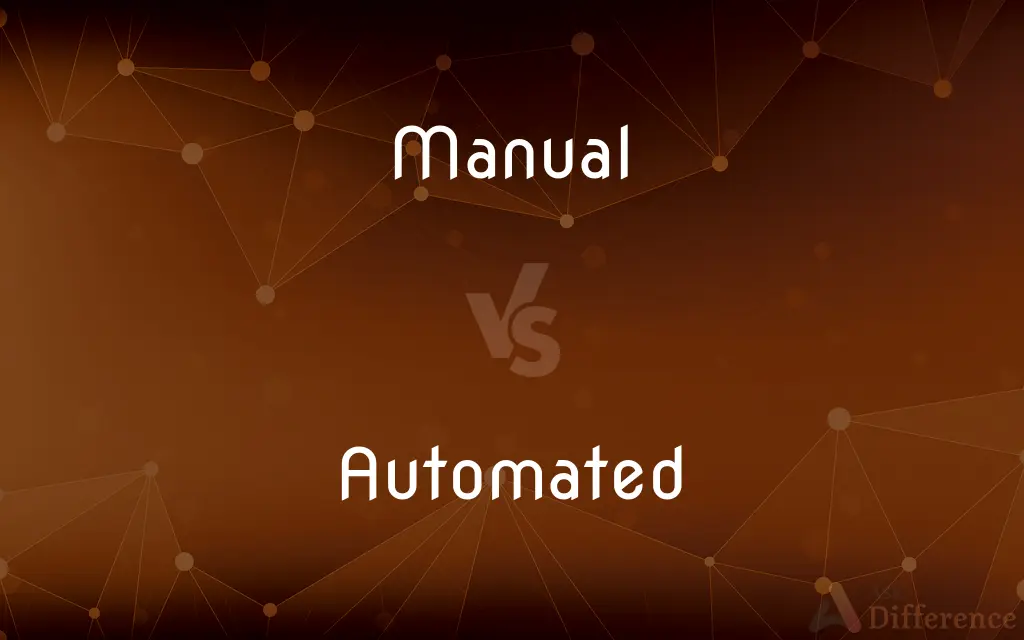Manual vs. Automated — What's the Difference?
By Tayyaba Rehman — Published on September 25, 2023
Manual involves human effort or intervention, while Automated uses technology or machines to function without continuous human input.

Difference Between Manual and Automated
Table of Contents
ADVERTISEMENT
Key Differences
Manual refers to tasks that are performed by human hands or effort. Automated systems, on the other hand, involve the use of technology or machines to carry out tasks without human intervention. Both represent two distinct approaches to performing work or operations.
When something is Manual, it often means that a human is directly involved in its operation or execution. This can sometimes lead to errors due to human limitations. In contrast, Automated processes often aim for precision and consistency, leveraging technology to achieve the same results repeatedly.
Manual processes are sometimes preferred for tasks that require human intuition, judgment, or personal touch. Automated processes might lack these human elements but can handle large volumes or complex calculations more efficiently than humans can.
Cost is another factor. Manual operations might have recurring costs related to labor, training, or inefficiencies. Automated systems might have higher initial setup costs but can lead to savings in the long run by reducing labor costs and errors.
In terms of adaptability, Manual processes can be more flexible in unpredictable situations, allowing humans to adapt on the fly. Automated systems, though consistent, might require reprogramming or recalibration when faced with unforeseen circumstances.
ADVERTISEMENT
Comparison Chart
Execution
Involves human effort or intervention.
Uses technology without human input.
Consistency
May vary due to human factors.
Typically consistent and precise.
Volume & Complexity
Limited by human capacity.
Can handle high volume & complexity.
Adaptability
Can adapt quickly to changes.
Might need reprogramming.
Cost over Time
Recurring labor costs.
High initial cost, but may save later.
Compare with Definitions
Manual
Operated or controlled by a human, not automatically or electronically.
The car has a manual transmission.
Automated
Operated by largely automatic equipment.
The factory introduced an automated assembly line.
Manual
Requiring human effort or physical labor.
Lifting those boxes is a manual task.
Automated
Functioning with minimal human intervention.
Automated customer service can sometimes feel impersonal.
Manual
Of or relating to the hands
Manual skill.
Automated
Having a capability to adapt to new information automatically.
The software has an automated update feature.
Manual
Done by, used by, or operated with the hands.
Automated
Made to occur as a reaction without conscious thought.
The doors had an automated response to motion.
Manual
Employing human rather than mechanical energy
Manual labor.
Automated
Systematically organized or controlled.
Payments are automated to save time.
Manual
Of, relating to, or resembling a small reference book.
Automated
To convert to automatic operation
Automate a factory.
Manual
A small reference book, especially one giving instructions.
Automated
To control or operate by automation.
Manual
(Music) A keyboard, as of an organ or harpsichord, played with the hands.
Automated
To make use of or be converted to automation
A food service that decided to automate for greater efficiency.
Manual
A machine operated by hand.
Automated
Made automatic.
Manual
A manual transmission.
Automated
Done by machine.
Manual
A vehicle having a manual transmission.
Automated
Simple past tense and past participle of automate
Manual
Prescribed movements in the handling of a weapon, especially a rifle
The manual of arms.
Automated
Accomplished by machinary without the intervention of a human operator; - of processes.
Manual
A maneuver in certain board sports, such as skateboarding, in which all of the board except one end is lifted off the ground, especially when the tip of the board is kept from making contact with the ground.
Automated
Operated by automation;
An automated stoker
Manual
A handbook.
Manual
A booklet that instructs on the usage of a particular machine or product.
The dishwasher isn't working; can you remember where we put the manual?
Manual
(military) A drill in the use of weapons, etc.
Manual
An old office-book like the modern Roman Catholic ritual.
Manual
(countable) A device that is operated using the hands, or by a human rather than a machine.
Manual
(automotive) A manual transmission; a gearbox, especially of a motorized vehicle, shifted by the operator.
Manual
(by synecdoche) A vehicle with a manual transmission.
I'm not used to automatics; I've always driven manuals.
Manual
(music) A keyboard for the hands on a harpsichord, organ, or other musical instrument.
Manual
A manual typewriter (as contrasted with an electronic one).
Manual
(countable) A procedure or operation that is done using the hands, or by a human rather than machine.
Manual
Manual measurement of the blood pressure, done with a manual sphygmomanometer.
Do a manual
Give someone a quick manual
Manual
A bicycle technique whereby the front wheel is held aloft by the rider, without the use of pedal force.
Manual
A similar maneuver on a skateboard, lifting the front or back wheels while keeping the tail or nose of the board from touching the ground.
Manual
(uncountable) Manual control or operation.
Put the controls to manual.
Leave the system on manual.
Manual
(of an activity) Performed with the hands.
Manual
(of a machine, device etc.) Operated by means of the hands.
Manual
Performed by a human rather than a machine.
The teacher urged the students to do a manual check, because some errors aren't picked up by the spell checker.
Manual
Of or pertaining to the hand.
Manual
Performed by a person using physical as contrasted with mental effort; as, manual labor.
Manual
Done or made by the hand. In some contexts, contrasted with automatic or mechanical.
Manual
A small book, such as may be carried in the hand, or conveniently handled; a handbook; specifically, the service book of the Roman Catholic Church.
This manual of laws, styled the Confessor's Laws.
Manual
A keyboard of an organ or harmonium for the fingers, as distinguished from the pedals; a clavier, or set of keys.
Manual
A prescribed exercise in the systematic handing of a weapon; as, the manual of arms; the manual of the sword; the manual of the piece (cannon, mortar, etc.).
Manual
A small handbook
Manual
(military) a prescribed drill in handling a rifle
Manual
Of or relating to the hands;
Manual dexterity
Manual
Requiring human effort;
A manual transmission
Manual
Doing or requiring physical work;
Manual labor
Manual laborer
Manual
Relating to or done by hand.
He compiled the data through manual entry.
Manual
A book of instructions or procedures.
She referred to the user manual to assemble the furniture.
Manual
Of, relating to, or involving muscular activity.
Manual laborers work hard in the fields.
Common Curiosities
What does Manual mean?
Manual involves tasks or processes that require human effort or intervention.
Can Manual processes be converted to Automated?
Yes, many manual processes can be automated with the right technology and programming.
Why might a company choose Automated processes?
Automated processes can offer precision, consistency, and efficiency, especially for high-volume tasks.
Are Manual tasks always inefficient?
No, Manual tasks may be preferred in situations requiring human intuition, judgment, or flexibility.
Is Automated the opposite of Manual?
Yes, Automated refers to tasks or processes that operate without continuous human input.
Can Automated systems ever make errors?
Yes, Automated systems can have flaws or be impacted by unexpected situations.
Which is more cost-effective: Manual or Automated?
It depends. Automated systems may have higher setup costs but can save in the long run, while Manual might have recurring labor costs.
Does Manual always refer to physical tasks?
No, Manual can refer to any task that requires direct human input, physical or otherwise.
Why might someone prefer Manual operations?
For tasks requiring personal touch, adaptability, or in cases where technology isn't accessible or feasible.
Can Automated processes be creative?
It's debated, but while Automated systems can mimic patterns, true creativity is often seen as a human trait.
Are all cars Automated now?
No, while there are self-driving cars, many vehicles still have manual controls and require human drivers.
Are there risks in Automated systems?
Yes, like any system, Automated processes can have vulnerabilities or unexpected failures.
Are Automated systems devoid of human touch?
While they operate without constant human intervention, humans design, program, and maintain Automated systems.
Can Manual tasks be more reliable than Automated ones?
Sometimes, especially in unpredictable environments where human judgment is crucial.
Is automation the future of all industries?
While many industries are moving towards automation, certain roles and tasks may always require the human touch.
Share Your Discovery

Previous Comparison
Adverb vs. Adverbial
Next Comparison
Accent vs. DialectAuthor Spotlight
Written by
Tayyaba RehmanTayyaba Rehman is a distinguished writer, currently serving as a primary contributor to askdifference.com. As a researcher in semantics and etymology, Tayyaba's passion for the complexity of languages and their distinctions has found a perfect home on the platform. Tayyaba delves into the intricacies of language, distinguishing between commonly confused words and phrases, thereby providing clarity for readers worldwide.












































